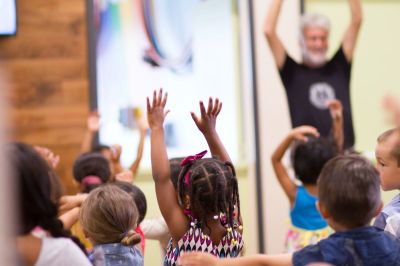Parents, help your kids learn to take risks

Our kids learn many of their most important lessons outside of the classroom, often without us noticing.
They develop new relationships with their own abilities every day when they take risks (and even when they fail). They ask and learn the answers to questions like: Am I capable? Am I enough? Can I do this myself? Can I ask for help, or is that failure?
Knowing this, we as parents can help them find the answers they need by adopting this perspective: Safe risk-taking is good for our children.
Risk is a good thing for our kids. It’s an essential part of preparing them for a full, free, independent life. And isn’t that what we want for them? Healthy risk-taking also develops grit, resilience and self-confidence in our kids.
We need to invest in these experiences and rethink our approach to risk management. And it’s hard — I get it. We want to protect our kids and not let anything bad happen to them, yes, but if we protect them too much they aren’t going to be prepped and ready for their adult years.
It’s also the case that these controlled risks have important long-term cognitive and psychological benefits. Children allowed to try and fail can train their brains to adopt a growth mindset, rather than a fixed one: Failure is a starting point, rather than an endpoint.
Research support this, suggesting that children go through a series of “crises” when they’re very young, that heavily influence their willingness to problem-solve independently, trust themselves or others, or take control of their lives. The earliest one occurs during the first year, when infants learn to trust.
But as children age, the “crises” and the impact of their resolutions become more complex: Around ages 3-6, when they start school, they’re exploring the limits of their own resourcefulness and usefulness. A little later — between ages 6-12 — they develop a sense of their competence and ability to master new and difficult tasks. As teens, their personal and social identities’ stability is determined, also by trial and error.
These “crises” are moments when children face the decision to either persist through failure or fear, or to shy away. I’ve seen my own children face these moments and watched them grow through them.
For instance, my son and daughter both recently ran for school council leadership. My daughter won her election and my son didn’t — yet I saw both of them thrive. My daughter had a great time being in charge. My son, on the other hand, was proud of his work: He knew he’d tried, that he’d persisted, and that our whole family was proud of him for doing so despite all the unknowns and anxieties associated with running for office.
Surrounding them in these moments with a safe environment and enthusiastic, loving peers and mentors helps them learn to persist, even when it’s hard. That’s why I love the WinShape Camps environment so much. It’s a safe place — one that isn’t overseen by mom or dad — where kids can take risks and reap the rewards of doing so.
At camp, we can help them rewire their brains. Struggle is part of the learning process, and so is failure! Mistakes can be celebrated — in fact, they should be, since research shows our brains develop new and important pathways when mistakes are made and corrected. Children who can regroup after failure are more emotionally resilient, with better problem-solving skills and less anxiety.
That’s why risk is so good, and so important for kids. These aren’t minor skills for children. They are essential to their growth and development.
That’s a bit hard for many moms to wrap their heads around. After all, we want our children to feel and to be safe! No mother wants her child to struggle or be afraid. But we also need to remember that our goal as parents is to help them lead full lives, lives with purpose, independence, richness and complexity. That’s something they need to learn to do on their own.
And that means trusting our kids to learn to trust themselves. It means letting them learn how to take falls, how to make mistakes, how to conquer their fears. But those lessons don’t come without a fall, a mistake, or a moment of fear.
Okay, parents, we can do this. Wrap your kids up in love, encouragement and empowerment — and then step back, and let them be brave.
Amy Lowe is the director of WinShape Camps for Girls and oversees WinShape Camps for Families. She has a Bachelor of Science in Business Administration from Samford University and a Master of Arts in Theology from Fuller Theological Seminary. Like most other moms, her hobbies include laundry, running the robot vacuum, and unloading the dishwasher.



























